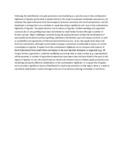Kabale apples: boom or burst? A study to develop strategies to exploit market opportunities for apple farmers in Kabale, Uganda.

View/
Date
2005Author
Chemining'wa, G
Mulagoli, I
Mwonga, S
Ndubi, J
Tum, J
Turyamureeba, G
Language
enMetadata
Show full item recordAbstract
Following the identification of apple production and marketing as a priority issue in the southwestern highlands of Uganda (particularly in Kabale district), this study (i) reviewed stakeholder perceptions; (ii) analysed the apple enterprise from the ecological, technical, economic and social perspectives; and (iii) developed a strategy that can contribute to apple becoming a significant cash crop in the southwestern highlands of Uganda. The apple industry is in its infancy in Uganda. Grafted seedlings and ungrafted rootstock (for in-situ grafting) have been distributed to small-holder farmers through a number of farmers' groups. Major challenges currently facing the apple enterprise include the development of appropriate horticultural practices (grafting, defoliation, fertilization, pest and disease control), as well as availability and organization of financial and technical services. So far, few apples have been sold from local production; although current plans envisage a production considerably in excess of current consumption in Uganda. If apples from the southwestern highlands are to compare with imports of fresh fruit (mainly from South Africa and Kenya) in the local markets (Kampala) or regionally (e.g. DR Congo), farmer organization, collective marketing and strong links to major outlets (e.g. supermarkets) will be essential. A number of agricultural enterprises have been tried and have failed in the past in this region of Uganda. As yet, the study found no shared and coherent vision of future apple production and marketing among the different stakeholders in the southwestern highlands. It is argued that if apples are to provide a significant means of livelihood for small-scale producers in this region, there is a need to coordinate stakeholders' actions through some sort of an industry steering committee or task force.
URI
http://www.cabdirect.org/abstracts/20053154977.html?resultNumber=6&q=au%3A%22Mwonga%2C+S.%22http://hdl.handle.net/11295/89191
Citation
Working Document - International Centre for Development Oriented Research in Agriculture 2005 No. 125 pp. xii + 53 pp.Publisher
University of Nairobi
